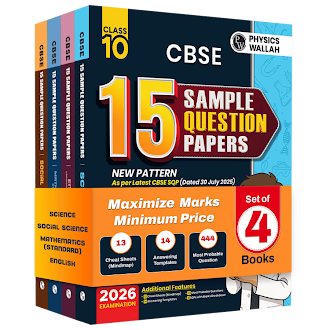CBSE Class 10 Civics Notes Chapter 6 Political Parties

CBSE Class 10 Civics Notes Chapter 6 Political Parties:- Political parties are an essential part of any democracy. They connect the government with the people, represent different ideas, and help in making important decisions for the country. Chapter 6 of CBSE Class 10 Civics, Political Parties, explains why political parties are necessary, how they function, and the challenges they face. It also discusses the role political parties play in shaping public opinion and addressing the needs of various groups in society.
For students, understanding this chapter is important to learn how democracy works in practice. To make learning easier, these class 10 political party notes provide clear and detailed explanations of all the key topics, such as the importance of political parties, their types, and the problems they deal with. Whether you are preparing for exams or revising the chapter, these notes of political parties class 10 will help you understand the subject in a simple way. With the help of these political parties class 10 notes, you can build a strong foundation and perform well in your studies.
Check out: CBSE Class 10th Books
CBSE Class 10 Civics Chapter 6 Overview
In this chapter, you will learn about the important role that political parties play in a democracy. Political parties help form governments, represent people's ideas, and make decisions that affect the country. You will also learn about the types of political parties, the problems they face, and how they work in a democracy. Check the overview of the CBSE Class 10 Civics Chapter 6 Overview below:-
-
Role of Political Parties: Political parties help in forming governments, contesting elections, and representing people’s views.
-
Types of Political Parties: There are national parties (like BJP, and Congress) and regional parties (like DMK, and TMC) in India.
-
Functions of Political Parties: Political parties contest elections, form governments, make laws, and act as opposition.
-
Challenges Faced by Political Parties: Parties face issues like corruption, lack of internal democracy, and misuse of power.
-
Importance of Political Parties: Political parties are important for smooth governance, offering choices to voters, and strengthening democracy.
CBSE Class 10 Civics Notes Chapter 6 Political Parties
Check out the class 10 civics chapter 6 notes in details below:-
Why Do We Need Political Parties?
Political parties are groups of people who come together to contest elections and hold power in the government. They agree on policies and programmes to promote the collective good.
Parties represent fundamental political divisions in society and are known for their policies, interests, and values. A political party typically consists of leaders, active members, and followers.
Functions of Political Parties
Political parties play several crucial roles in a democracy:
-
Contesting elections: Parties participate in elections and offer various policies and programmes for voters to choose from.
-
Making laws: Parties play a vital role in legislatures, shaping and passing laws for the country.
-
Forming and running governments: Parties that win elections form governments and govern the country.
-
Opposition: Parties that lose elections serve as the opposition, holding the government accountable and voicing different views.
-
Shaping public opinion: Parties influence public opinion through their policies and actions.
-
Access to government: Parties provide people access to government machinery and welfare schemes.
Check out: CBSE Class 10th Sample Papers
The Necessity of Political Parties
Political parties are essential because they fulfill these functions and represent diverse views in society. They bring together representatives to form responsible governments, make policies, and justify or oppose them, fulfilling the needs of representative democracy.
How Many Parties Should We Have?
In a democracy, any group of citizens can form a political party. While over 750 parties are registered in India, the effectiveness of parties varies. One-party systems and two-party systems are less desirable than multi-party systems, where several parties compete for power. India operates under a multiparty system, promoting diverse political representation.
National Parties
National parties are political organizations recognized at the national level by the Election Commission of India. These parties operate across multiple states and regions of the country. To be recognized as a national party, a political party must fulfill certain criteria set by the Election Commission:
-
Securing at least 6% of the total votes in an election to the Legislative Assembly of a State and winning at least 2 seats is recognized as a State Party.
-
Securing at least 6% of the total votes in Lok Sabha elections or Assembly elections in four states and winning at least 4 seats in the Lok Sabha is recognized as a National Party.
National parties play a significant role in shaping national politics and policies. They have a presence in various states and often contest elections across the country. They may have distinct ideologies, policies, and organizational structures that differentiate them from regional parties.
Major National Parties in India
India has several major national parties that play a prominent role in the country’s political landscape. These parties have a significant presence across various states and regions of India. Here are some of the major national parties:
-
Bharatiya Janata Party (BJP): Founded in 1980, the BJP is one of the largest political parties in India. It espouses the ideology of Hindutva and advocates for cultural nationalism. The party has a strong presence in both urban and rural areas and has been in power at the national level multiple times.
-
Indian National Congress (INC): The Indian National Congress, often referred to as the Congress Party, is one of the oldest political parties in India. Founded in 1885, it played a pivotal role in the Indian independence movement. The party advocates for secularism, social justice, and inclusive development. It has had a significant influence on Indian politics and has been in power for several terms at the national level.
-
Communist Party of India (CPI): The CPI is a left-wing political party in India that follows the principles of Marxism-Leninism. It advocates for socialism, secularism, and democracy. The party has a strong presence in states like Kerala, West Bengal, Punjab, Andhra Pradesh, and Tamil Nadu.
-
Communist Party of India – Marxist (CPI-M): The CPI-M is a splinter group of the CPI that was formed in 1964. It also adheres to the principles of Marxism-Leninism and focuses on socialist policies, secularism, and democracy. The party has a significant presence in states like West Bengal, Kerala, and Tripura.
-
All India Trinamool Congress (AITC): Founded in 1998 by Mamata Banerjee, the AITC is a regional party that gained prominence in West Bengal. It advocates for secularism, federalism, and the welfare of the people. The party has expanded its presence to other states as well.
-
Bahujan Samaj Party (BSP): The BSP was founded in 1984 by Kanshi Ram and focuses on representing the interests of the Bahujan Samaj, which includes Dalits, Adivasis, OBCs, and religious minorities. It has a significant presence in Uttar Pradesh and other states in northern India.
-
Nationalist Congress Party (NCP): Formed in 1999 following a split from the Congress party, the NCP supports democracy, secularism, and social justice. It has a major presence in Maharashtra and has been a coalition partner in several governments.
Also check: CBSE Class 10th Question Banks
State Parties
State parties, also known as regional parties, play a significant role in India’s political landscape, particularly at the state level. These parties primarily focus on the interests and issues specific to a particular state or region. Here are some examples of state parties in India:
-
Biju Janata Dal (BJD): The BJD is a regional party based in the state of Odisha. It was founded by Naveen Patnaik in 1997 and advocates for the development and welfare of Odisha and its people.
-
Sikkim Democratic Front (SDF): The SDF is the ruling party in the state of Sikkim. It was founded in 1993 by Pawan Chamling and focuses on the socio-economic development of Sikkim and the welfare of its people.
-
Mizo National Front (MNF): The MNF is a regional party in the state of Mizoram. It was formed in 1959 and has played a significant role in Mizoram’s politics. The party advocates for the interests of the Mizo people and the development of Mizoram.
-
Telangana Rashtra Samithi (TRS): The TRS is a regional party based in the state of Telangana. It was founded by K. Chandrashekar Rao in 2001 and played a crucial role in the formation of the separate state of Telangana. The party focuses on the development and welfare of Telangana and its people.
How to Use CBSE Class 10 Notes
-
Read the Chapter First: Start by reading the full chapter from your textbook carefully. For example, in Civics Chapter 6, Political Parties, learn about their functions, importance, and challenges.
-
Use the Notes for Revision: After reading the chapter, go through the CBSE Class 10 notes. These notes explain the main points in a simple and easy way.
-
Focus on Key Points: Pay attention to important terms, definitions, and examples in the notes, such as the types of political parties or their role in democracy.
-
Practice Questions: Use the notes while solving questions from the textbook or previous year’s papers. This will help you understand and remember the topics better.
-
Write Short Summaries: Try to make your own short summaries based on the notes. For example, summarise the key points about political parties or their importance in a few lines.
-
Revise Often: Read the notes regularly to keep the information fresh in your mind. This is useful for all chapters, especially ones with more facts and details like History or Science.
Check out: CBSE Class 10th Previous Year Papers
CBSE Class 10 Books for All Subjects
|
- |
Class 10 Political Parties Notes FAQs
-
What is the role of political parties in a democracy?
Political parties play a key role in forming governments, representing people’s views, making policies, and creating a link between citizens and the government. -
Why are political parties necessary?
Political parties are necessary to organise public opinion, contest elections, and provide a platform for various ideologies, ensuring smooth functioning of a democracy. -
What are the types of political parties in India?
In India, political parties are broadly classified into national parties (like the Indian National Congress and BJP) and regional/state parties (like DMK and TMC). -
What are the main challenges faced by political parties?
Some key challenges include lack of internal democracy, corruption, excessive use of money and muscle power, and the absence of meaningful choices for voters. -
What are the functions of political parties?
Political parties contest elections, form governments, provide opposition, shape public opinion, and bring various groups together under one platform.












